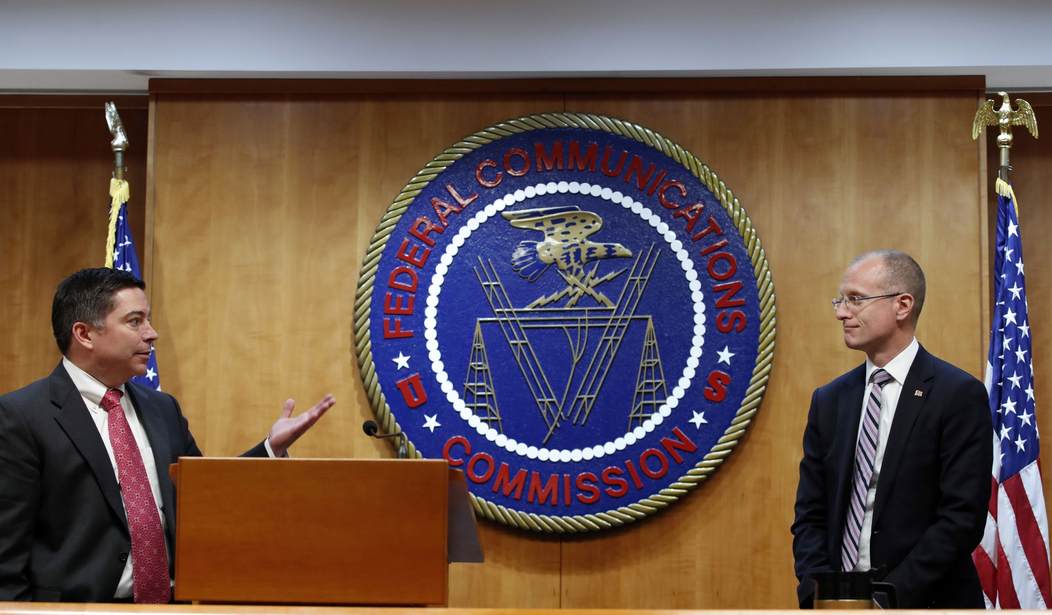"The censorship cartel must be dismantled," Brendan Carr declared two days before President-elect Donald Trump picked him to chair the Federal Communications Commission. Trump described Carr as "a warrior for Free Speech."
Carr's plans for "reining in Big Tech" understandably appeal to Trump, who has long complained that the leading social media platforms are biased against him. But Carr's agenda is blatantly inconsistent with conservative principles, including limited government, free markets, freedom of speech, and opposition to lawless regulation.
Carr, a Republican telecommunications lawyer who has served as an FCC commissioner since Trump appointed him during his first term in August 2017, says "the censorship cartel" includes businesses such as Facebook, Google, Apple and Microsoft. It also supposedly includes NewsGuard, a company that rates the reliability of news and information sources.
As Carr tells it, these businesses have conspired to silence "core political, religious, and scientific speech" by "defund(ing), demonetiz(ing), and otherwise put(ting) out of business news outlets and organizations that dared to deviate from an approved narrative." They have punished Americans for "doing nothing more than exercising their First Amendment rights."
Carr's complaint goes far beyond legitimate concerns about government pressure on social media platforms to suppress speech that federal officials viewed as a threat to public health, democracy or national security. He portrays purely private action, including independent content moderation and the advice that informs it, as a violation of the First Amendment.
That is clearly wrong, because the First Amendment constrains government power, not content decisions by private businesses. To the contrary, the Supreme Court has repeatedly recognized that the First Amendment protects such editorial discretion, as Justice Elena Kagan noted last February in an opinion joined by four of her colleagues.
Recommended
"The principle does not change because the curated compilation has gone from the physical to the virtual world," Kagan wrote. "In the latter, as in the former, government efforts to alter an edited compilation of third-party expression are subject to judicial review for compliance with the First Amendment."
Unfazed by that point, Carr sees one of the laws at issue in that case, a Texas statute that says social media platforms may not "censor" content based on "viewpoint," as a model for federal legislation. He nevertheless concedes that "some" conservatives "do not think that the FCC or Congress should act in a way that regulates the content-moderation decisions of private platforms" because "doing so would intrude -- unlawfully in their view -- on the First Amendment rights of corporations to exclude content from their private platforms."
Carr favors legislation that "scraps" federal protection from civil liability for user-posted content -- a crucial safeguard against potentially crippling litigation that has made the internet as we know it possible. Although Carr thinks that step would promote "a diversity of viewpoints," one likely result would be even stricter content moderation, aimed at avoiding any possible pretext for a lawsuit.
Even without new legislation, Carr argues, the FCC can curtail liability protection through statutory interpretation, "impose transparency rules on Big Tech," and require changes to the policies and procedures of social media companies. That agenda should alarm any conservative who inveighs against overweening federal agencies empowered to invent their own authority.
The Supreme Court struck a blow against such lawlessness last June, when it repudiated the Chevron doctrine, which required that judges defer to an agency's "reasonable" or "permissible" interpretation of an "ambiguous" statute. Carr himself praised that decision, saying "it puts individuals or businesses on a much more level playing field with an administrative agency."
Carr probably had in mind attempts by a Democratic FCC majority to impose "net neutrality" requirements on internet service providers by treating them as "common carriers." But objections to regulations based on dubious statutory interpretations apply with equal force to his own agenda.
Republican complaints about arbitrary, unfair and politically biased content moderation may or may not be fully justified. But they cannot give the FCC powers it does not have.

























Join the conversation as a VIP Member